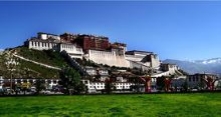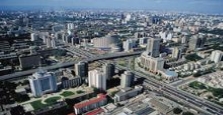题目内容
One day, a tramp (流浪汉) was sleeping on a park bench, ____1.(satisfy) with the afternoon sunshine. A couple walked by. The man stopped, woke the tramp up, and asked him, “Excuse me. ___2.you have the time?” the tramp replied, “I’m sorry---I don’t have a watch, so I don’t know the time.” The man apologized and walked away with his wife.
The tramp lay down and went back to sleep. Just then, a woman, ___3.___ was out walking her dog, shook the tramp’s shoulder until he woke up, ___4.said, “I’m sorry to trouble you, but do you happen ___5.___ (know) the time?” The tramp was a little annoyed at ___6.(wake) up again, but he politely told the woman he didn’t have a watch and had no idea ___7.___ the time. After the woman left, an idea ___8.(occur) to the tramp. He opened his bag and took out a pen and a piece of paper. He wrote down with all his ___9.(strong), “I do not have a watch. I do not know the time.” He then hung the paper round his neck thinking that nobody would hold him back in his sleep. Fifteen minutes ___10., a policeman noticed the tramp and the sign around his neck. Out of a sense of responsibility, he woke the tramp up and said, “It’s 2:30 p.m.”
1.satisfied
2.Do
3.who
4.and
5.to know
6.being woken
7.of
8.occurred
9.strength
10.later
【解析】
试题分析:这主要讲述了一个笑话,一个流浪汉睡在公园的长椅上,有两次被问到时间,因为没有手表,所以不知道具体时间,他很不高兴别人打扰他睡觉,于是写了一个纸片,说明情况,最后警察来告诉他时间,他最终还是被打扰了。
1. satisfied with 是固定词组,此句中,主谓宾很完整,satisfied with the afternoon sunshine 作为一个形容词短语修饰主语。故填satisfied。
2. have the time ,可至此处借用助动词Do来提问。故填Do。
3. out walking her dog只能作为一个定语从句,起修饰a woman 的作用,定语从句中修饰人用who,故填who。
4.
5. know。这整句话的意思是:“很抱歉打扰您,但是请问一下,您知道现在是几点了吗?”此题考查的是词组happen to “刚好,恰巧”的意思,to后面接动词原形,故填to know。
6. woken。这半句话的意思是:“流浪汉对再次被被弄醒感到很恼火”,be annoyed at是“对....很恼火、气恼”,词组中的介词at 后面接的是动名词,流浪汉是被吵醒的,因此应该用被动语态,故填being woken。
7. no idea of ,这是固定词组,“不知道......”的意思,故填of。
8. occur to sb , 整篇文章当中的时态全部运用过去时,因此此处也应该选用过去时,occur的过去式是双写r加ed,故填occurred。
9.
10.
考点:考查故事类阅读

阅读下列材料,从所给的六个选项(A、B、C、D、E 和 F)中,选出符合各小 题要
求的最佳选项,选项中有一项是多余选项。请在答题卡上按题号56-60将相应选项字母涂黑。
A |
| City: Lhasa Temperature in July:15-17℃ Attractions: blue sky, fresh air and wonderful dances |
B |
| City: Harbin Temperature in July: 24-30℃ Attractions: some old buildings in Russian style |
C |
| City: Chongqing Temperature in July: 28-30℃ Attractions: tall mountains, hot food and friendly people. |
D |
| City: Hong Kong Temperature in July: 29-30℃ Attractions: nice and cheap clothes, all kinds of tasty food and chances to find good jobs. |
E |
| City: Guilin Temperature in July: 29-30℃ Attractions: fantastic hills, clean rivers and many other natural sights. |
F |
| City: Sanya Temperature in July: 27-32℃ Attractions: exciting water sports, lovely beaches and great tropical fruit. |
请阅读以下五个人的信息,然后为他们选择最适合的一处地方:
1.Joe comes from Moscow(莫斯科). He has studied in Beijing for two years. So he misses his hometown very much. He hopes to go to a city where he can find the feeling of returning home.
2.Mary is an American girl. She likes going shopping. This year she’ll graduate from a famous Chinese college. So she is planning to travel to a city where she may find a job.
3.Henry is from Canada. He is interested in surfing and diving. But the city in which he is living is far from the sea. So he is expecting to get to a place where he can do these activities and taste bananas and pineapples(菠萝).
4.Rosa comes from Britain. She cannot stand hot weather. And she thinks some Chinese cities have too much pollution. So she wants to go somewhere clean and peaceful.
5.Timmy comes from Japan. He has great interest in taking photos. He is looking forward to staying close to nature. He even wants to take a boat while taking photos. However, he doesn’t like hot food.






